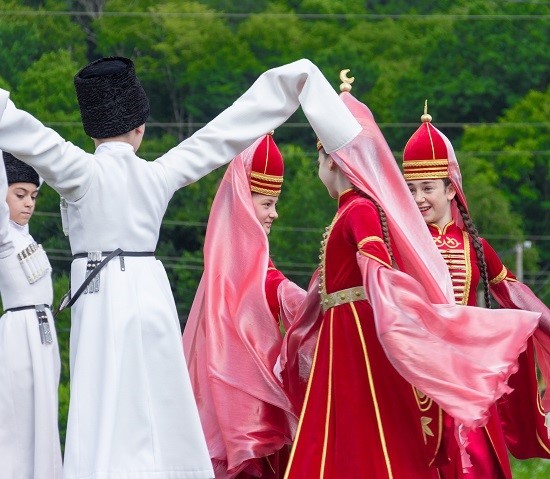Circassians are the inhabitants of a large chunk of the
Western Caucasus, stretching from what is now
Russia’s border with Georgia to
the frontier with Crimea, a region with majestic mountains and scenic
Black Sea coastline. This geographical positioning has brought the 12 Circassian tribes,
characterized by love for liberty, great commitment to the nation, and a
warrior spirit, into conflict with many of history’s great empires.
اضافة اعلان
They fought the last of these empires, the Czarist Russia,
for 100 years before most were ultimately massacred and expelled from their
homes in modern history’s first genocide. The survivors headed for the
Ottoman Empire, and a few settled in Jordan. In the new country, Circassians engaged in
every field. They even produced a prime minister, Said Al-Mufti, and Amman’s
first mayor, Ismail Babouk. Jordanian Circassians are a fine example of a
well-adjusted community.
Their exile from the
Caucasus meant that the preservation of
their culture has been in jeopardy. Despite efforts, including Circassian
associations and even a school, only a fifth of Jordanian Circassians speak
their language, perhaps an inevitability of integration.
The storied history of Jordan’s Circassians, as well as
their future aspirations and worries, deserves to be discussed, and the perfect
person to speak to is Radi Alkhas-Hatogh, the current head of Jordan Media
City.
Alkhas’ family, who are of the Bzedugh tribe, had a great
role in the building of Jordan. He recounts that his family came to Jordan
around 1893 after spending some time in Turkey. When his father, Abdulkarim
Alkhas Hatogh, was a child, his family was the first to permanently settle the
Naur district.
As with the vast majority of Circassians, they came to
Jordan because of persecution. In Abdulkarim Alkhas’ case, this harsh
experience pushed him to join the Ottoman army, where he became an officer. At
the start of the
Great Arab Revolt, he joined King Abdullah I, helping him to
establish Jordan. He became the seventh officer to join the Arab Army and
served from 1921-1940 as an officer and commander in Salt, Irbid and Maan.
Radi Alkhas grew up in Irbid and attended Secondary School
in
Ramallah. He spent two years at the American University of Beirut, followed
by a move to London University, from where he graduated in 1965 as an
electrical/telecommunications engineer. Back to Jordan, he became an officer in
the Electrical/Mechanical Engineer Corps that same year.
 (Photo: Shutterstock)
(Photo: Shutterstock)
“Back then, almost every Circassian was a government
official or an army officer, and there were no other viable opportunities,” he
said.
“In the 60s, there was one Circassian merchant, I think he
sold cutlery, but that was the only one,” he said.
At the end of 1967, the trajectory of his career changed. He
started working with
Jordan Radio and Television, where he stayed for 27 years,
becoming director-general in the last five. In 1994, he joined Arab Radio and
Television. During his time there, he established Jordan Media City, the first
of its kind in the Arab world. A key figure in the development of media in
Jordan, he has made his mark on the country’s history.
Alkhas sees no contradiction between being a
Circassian and
a loyal Jordanian citizen. While he considers himself a Jordanian first and
foremost, he is heavily involved in Circassian charities, clubs and media
outlets.
He believes the noble traits of most Circassians make them
excellent Jordanians.
“The number one trait of Circassians is honesty, they tell
you things straightforwardly and they never lie,” he said.
It seems like a biased assessment, but it has credibility.
Circassian politicians in Jordan tend to have a clean track record, and the
community has produced some of Jordan’s greatest war heroes, a fact that Alkhas
once more attributes to the Caucasian warrior spirit and to their khabze, the
Circassian moral code.
One would expect Circassians to choose between engaging in
Jordanian society and preserving their unique culture. Alkhas, and most other Circassians
in Jordan, say that this is not the case. This generation of Circassians is
conscious of its obligation to both. Take the issue of language, mentioned
above. Typically, diaspora communities lose command of the native tongue by the
third generation, and other cultural traits. But as Alkhas proudly observed,
the opposite is the case among Jordan’s Adigexer (Circassians).
 (Photo: Shutterstock)
(Photo: Shutterstock)
“The first generation was deeply in touch, but the second
generation had got more involved in
Arab society and became disconnected. I do
not know Circassian very well myself,” he said, adding that “this generation
does an excellent job at keeping the culture. They do it inherently”, an
impressive feat considering that this is the most integrated Circassian
generation.
Clearly, one must draw the line between that and being
assimilated. Every aspect of
Circassian culture is represented in Jordan;
numerous Circassian dance troupes keep the ancient art form alive, and a
Circassian restaurant by the name of Sawamer exists (a special mention for
Amman’s foodies).
When asked where he sees the Circassian community in 50,
maybe 100 years, Alkhas said he expected the trend of job diversification
amongst Circassians to continue. In recent decades, Circassians have been
transitioning from just officers and officials to businessmen and technology
specialists. Although it is a trend that Alkhas welcomes, he concedes that
“Circassians are naturally public servants”, so why not continue down that
path?
Aside from modernization and upper-middle class status
presenting new opportunities to Circassians, some feel that they have been
pushed out of old ones. In recent years, Circassians complained that candidates
from Arab tribal backgrounds are preferred in military positions. The leaders
of the Circassian community have lambasted this closing of a door that has
always been open.
Alkhas does not feel this is the case, believing, instead,
that the future of that system will determine the fate of Jordan’s Circassian
community.
“Circassian identity and culture might stay, but if the
tribal system disappears, so will the Circassian community.”
Obviously, the Circassians themselves will remain, but their
tightknit social circle may wither away as the country’s judicial system
expands. In the current climate, Circassians feel compelled to help their own
out when it comes to matters of law and compensation. They have their own diwan
and all of
Jordan’s Circassians, no matter their tribe, function as one social
unit, ready to assist their kinfolk at any given moment.
All in all, Jordan’s Circassians form an integral part of
our country, and their contribution far exceeds their numbers. They are a
nation who have known hardship all too well, but this has taught them to
weather storms better than most.
Circassians carry ancient values of loyalty, bravery, and
honesty into the modern age, which makes them and their culture valuable to any
state they reside in. Their war with the Russians has ended, but they fight a
new battle to keep their heritage of millennia alive.
Read more Features



